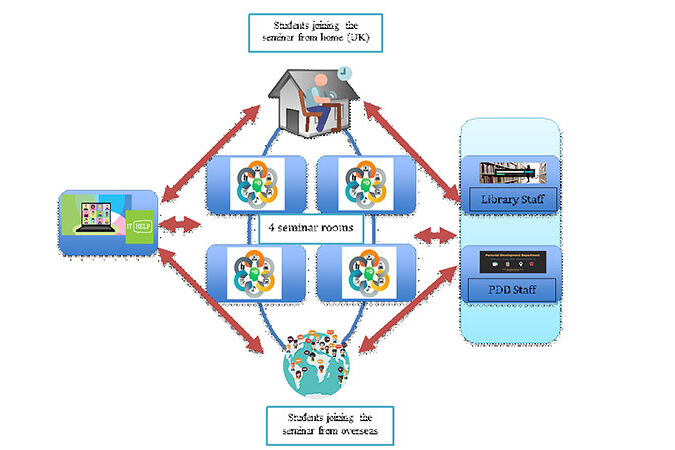
Blog Article

This blog reflects on an experimental pop-up session I devised and trialled with a group of graduate students in HELS based on Ursula Le Guin’s ‘Carrier Bag Theory of Fiction’ (2019). The session aimed to create a space for students to think about their doctorates as being not only linear reports of their academic research but also as crafted expressions of the complex, tangled nature of their lives and experiences.
‘It matters what stories we tell to tell other stories with; it matters what concepts we think to think other concepts with.’ (Haraway 2019:10)
I am an academic and a writer of fiction and the more I write in both forms the more I realise the similarities between the two. I firmly believe that writing a thesis in the humanities or social sciences is an enormously creative act and that a thesis is, at heart, a story. After all, no two people would ever write a thesis in the same way even if they read all the same books, had exactly the same data, used the same theoretical framework and had the same supervisors.
I wanted to find a way to help doctoral students tap into the creativity and uniqueness they bring to their research and I found a short book by the novelist Ursula Le Guin in which she presents her ‘Carrier Bag Theory of Fiction’ (2019) as a fresh and potentially useful way of thinking about doctoral writing.
In essence, Le Guin claims that the history of humankind has been told as an arrow being fired in a straight line in order to make a simple, powerful narrative involving action, male heroes and weapons. However, Le Guin argues that the real stories are in the items gathered in bags by the ones who weren’t the hunters, but who were the carriers and gatherers (most often these were the women).
She writes: ‘we’ve heard all about the sticks and spears and swords…but we have not heard about the thing to put things in, the container for the thing contained. That is a new story. That is news.’ (2019: 29)
In this sense Le Guin reimagines stories as bags for collecting, carrying and telling the ‘stuff’ of living: ‘A leaf a gourd a shell a net a bag a sling a sack a bottle a pot a box a container. A holder. A recipient’ (2019: 32).
She explains that in perpetuating the tradition of telling stories in a linear way we miss out so much ‘stuff’, parts of the story that don’t fit the ordained narrative perhaps or aspects of ourselves or experiences that aren’t seen as relevant to the story we are writing.
I took this idea and translated it into a pop-up session for doctoral students who were interested in exploring different creative approaches to their writing. From the carrier bag perspective we can see how the traditional doctorate is linear, edited, pared down to be a story of ‘sticks and spears’ (problem, action, solution!). I wondered what might come up if we allowed students to rummage in the carrier bags of their lives and make some new connections between who they are and the research they are doing.
The students who signed up were asked to find 3 objects which were somehow related to their research or to the experience of doing their doctorate, put them in a bag and bring them to the online pop-up session. These objects could be linked in practical ways (eg a coffee cup used every day), academically (a favourite book) or for more esoteric reasons related to reflections, memories, dreams, conversations or experiences that were meaningful to them even if tangential to the actual business of writing a doctorate.
The session was organised into three stages. In the first stage, the students were asked to choose one of their objects and tell the group the story of how it related to their doctoral research or journey. In stage two they choose another object and wrote and then shared 30 words about how it was significant to them, and in the final stage, they wrote 3 words encapsulating the relevance of the last object.
The conversations stimulated by these objects and activities were fascinating, informative and insightful, although private to the group who participated so I will not share them here.
What I will say though is that the session demonstrated to me that fresh ways of thinking about doctorates can open up possibilities for innovative connections and different forms of writing. Le Guin’s ‘Carrier Bag Theory of Fiction’ can be used as a springboard to give students permission to value non-linear ways of talking about their research, adding depth and richness to the research stories we are all striving to tell.
References
Le Guin (2019) The Carrier Bag Theory of Fiction (Introduced by Donna Haraway). Ignota.




